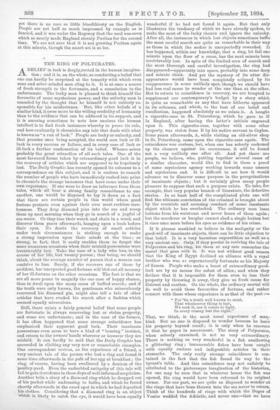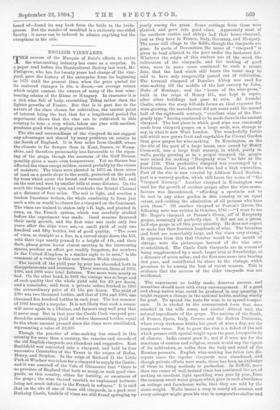THE RING OF POLYORATES. A BELIEF in luck is deeply rooted
in the human imagina- tion ; and it is, on the whole, so comforting a belief that one can hardly be surprised at the tenacity with which even sane and sober-minded men cling to it. It is at once a source of fresh strength to the fortunate, and a consolation to the unfortunate. The lucky man is pleased to think himself the favourite of some mysterious power, and the unlucky man is consoled by the thought that he himself is not entirely re- sponsible for his misfortunes. But, like other beliefs of a similar kind, it owes more to the willing credulity of humanity than to the evidence that can be adduced in its support, and it is amusing sometimes to note how anxious the human intellect is to find fresh instances whereby to prove its rule, and how exultantly it chronicles ang tale that deals with what is known as " a run of luck." People are lucky or unlucky, and that premiss once being accepted, the world sees luck or ill- luck in every success or failure, and in every case of luck or ill-luck a further confirmation of its belief. Whence arises probably the great attraction of all such tales. One of the most favoured forms taken by extraordinary good luck is in the recovery of articles which are supposed to be hopelessly lost. The Daily Graphic has recently opened its columns to a correspondence on this subject, and it is curious to remark the number of people who have immediately rushed into print to chronicle the strange instances that have come under their own experience. If one were to draw an inference from these tales, which all bear a strong family resemblance to one another, one would be disposed to lay it down as a fact that there are certain people in this world whom good fortune protects even against their own most reckless care- lessness. They drop diamond pins into the sea and scoop them up next morning when they go in search of a jugful of sea-water. Or they lose their watch and chain in a wood, and discover them years afterwards, hanging upon a bush before their eyes. No doubt the recovery of small articles under such circumstances is striking enough to make a strong impression upon their minds at the time ; so strong, in fact, that it easily enables them to forget the more numerous occasions when their mislaid possessions were irretrievably lost. Take the case of a lady who has, in the course of her life, lost twenty purses ; that being, we should think, about the average number of purses that a woman can contrive to lose. Surely, if she recovers one of these by accident, her unexpected good fortune will blot out all memory of her ill-fortune on the other occasions. The fact is that we are all more prone to magnify the one case of happy chance, than to dwell upon the many oases of baffled search ; and if the truth were only known, the gentleman who miraculously recovered his diamond pin, might also tell a tale of other articles that have evaded his search after a fashion which seemed equally miraculous.
Still, there exists a fairly general belief that some people are fortunate in always recovering lost or stolen property, and some are unfortunate ; and in the case of the former, it has often happened that some strange coincidence has emphasised their apparent good luck. Their inanimate possessions even seem to have a kind of " homing " instinct, and return to the owners' hands wherever or however they are mislaid. It can hardly be said that the Dailey Graphic has succeeded in eliciting any very new or remarkable examples. One correspondent revives, as the experience of a friend, a very ancient tale of the person who lost a ring and found it some time afterwards in the yolk of her egg at breakfast ; the ring, of course, having been swallowed by a denizen of the poultry-yard. Even the undoubted antiquity of this tale will fail to gain it credence in these days of well-informed scepticism. Another tells a story of a diamond ring which he dropped out of his pocket while undressing to bathe, and which he found shortly afterwards in the exact spot in which he bad deposited his clothes. Considering that a diamond ring is an object which is likely to catch the eye, it would have been equally wonderful if he had not found it again. But that only illustrates the tendency of which we have already spoken, to make the most of the lucky chance and ignore the unlucky.
After all, the instances in which lost objects sometimes baffle the most careful search are quite as remarkable in their way as those in which the seeker is unexpectedly rewarded. It has happened, within our knowledge, that a ring, let fall one minute upon the floor of a room, has the next minute been irretrievably lost. In spite of the limited area of search and the most thorough and careful investigation, the ring had disappeared—apparently into space, probably into some deep and minute chink. And yet the mystery of its utter dis- appearance would have been completely eclipsed by its reappearance in some unlikely spot, though we should have had less real cause to wonder at the one than at the other. But to return to coincidence in recovery, we are tempted to supplement our contemporary's budget by a story which is quite as remarkable as any that have hitherto appeared in its columns, and which, to the best of our belief and recollection, happened absolutely as we relate it. A bought a cigarette-case in St. Petersburg, which he gave to B in England, after having the latter's initials engraved upon it. This cigarette-case, together with some other property, was stolen from B by his native servant in Ceylon. Some years afterwards, A, while visiting an old-silver shop in St. Petersburg, came upon the cigarette-case again. The coincidence was curious, but, when one has soberly reckoned up the chances against its occurrence, it will be found not a very unlikely one after all. And yet there are people, we believe, who, putting together several cases of a similar character, would like to find in them a proof of some mysterious agency working towards some unseen and mysterious end. It is difficult to see how it would advance us to discover some purpose in the peregrinations of inanimate objects ; but it certainly gives many people pleasure to suppose that such a purpose exists, To take, for example, that very popular branch of literature, the detective stories. In at least half of the complicated plots one will find the ultimate conviction of the criminal is brought about by the eccentric and accusing conduct of some inanimate object which he has overlooked. The ordinary man loses buttons from his waistcoat and never hears of them again ; but the murderer or burglar cannot shed a single button but it rises once more before his eyes as evidence of his crime.
If it pleases mankind to believe in the malignity or the good-will of inanimate objects, there can be little objection to that belief, It is a very harmless superstition as well as a very ancient one. Only, if they persist in reviving the tale of Polycrates and his ring, let them at any rate remember the moral that goes with it. It was not without good reason that the King of Egypt declined an alliance with a royal brother who was sa supernaturally fortunate as his Majesty of Samos. People who make a boast of extraordinary good- luck are by no means the safest of allies; and when they declare that it is impossible for them even to lose their property by throwing it away, they give us fresh cause for distrust and caution, On the whole, the ordinary mortal will do well to avoid these favourites of fortune, and rather consort with those whose experience is as that of the poet " Fortis a truth well known to most, That whatsoever thing is lost, We seek it, ere it comes to light, In every cranny but the right."
That, we think, is the most usual experience of man- kind. But no one is disposed to wonder because he loses his property beyond recall ; it is only when he recovers it that he gapes in amazement. The story of Polycrates, when soberly examined, is not so very extraordinary. There is nothing so very wonderful in a fish swallowing a glittering ring ; innumerable fishes have been caught with equally curious and indigestible articles in their stomachs. The only really strange coincidence is con- tained in the fact that the fish found its way to the tyrant's table. And this coincidence may not unfairly be attributed to the picturesque imagination of the historian, for one may be sure that in whatever house the fish was opened, the ring would have been returned to its original owner. For our part, we are quite as disposed to wonder at the rings that have been thrown into the sea never to return. Think of the hundreds of rings with which the Doges of Venice wedded the Adriatic, and never one—that we have heard of—found its way back from the bride to the bride- „groom. But the wonder of mankind is a curiously one-sided faculty : it never can be induced to admire anything but the exceptions to the rule.



































 Previous page
Previous page